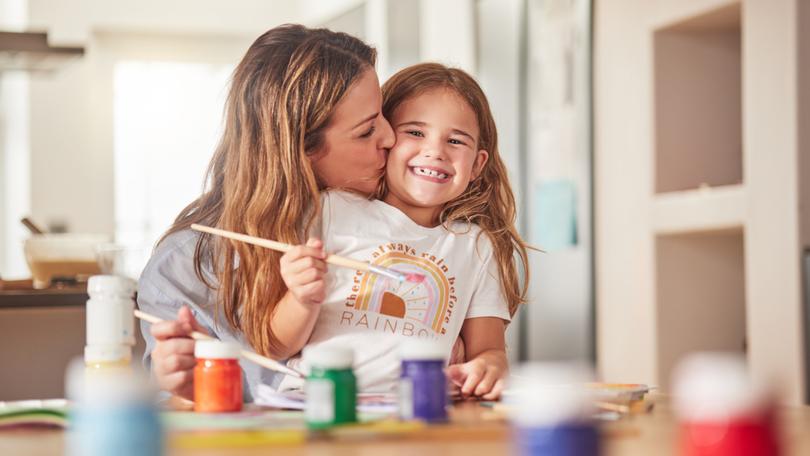Why it’s OK for mums to have a favourite child
Over the years, I’ve worked with many clients deeply impacted by how, growing up, they felt they were the less loved child.

Admitting you have a favourite child can feel like committing a crime against motherhood.
It’s the ultimate parenting taboo.
But as humans we’re fundamentally predisposed to lean towards people whose behaviour we find most appealing.
Sign up to The Nightly's newsletters.
Get the first look at the digital newspaper, curated daily stories and breaking headlines delivered to your inbox.
By continuing you agree to our Terms and Privacy Policy.In any other familial relationship it’s OK to have a favourite – many of us would admit that we’re closer to one parent over another or have a better relationship with a particular sibling or grandparent.
But when it comes to the mother-and-child relationship, a woman is expected to switch off that very normal response.
The word “favourite” suddenly becomes inflammatory, because people equate liking with loving, assuming that because you favour one child over another, you love them more.
This isn’t the case at all. I have two sons, aged ten and eight, and a five-year-old daughter, and I do have a favourite child.
I love them equally and would run into a burning building for each of them.
But I favour one over the others. Here’s the thing: which child I happen to prefer changes day by day, sometimes hour by hour.
Having a favourite child really is a normal part of everyday life as a parent.
It all depends on how they are behaving and the impact that is having on me.
Do I lie awake at night, riddled with shame and worrying this makes me a bad mother – which is what clients have told me they do on days when they’ve felt as though they liked one of their children more?
Absolutely not.
But that’s because, as a psychotherapist, I understand the science behind how my brain is wired to gravitate towards calm.
If one of my children is being loud and unpredictable, my nervous system knows this is going to create a stress response in me.
And so, it will direct me towards whichever child is offering the smoothest, most relaxed ride.

Parental favouritism really is no more complicated than that.
But it is a hot topic at the moment, after scientists at Brigham Young University in the US analysed 30 studies on the subject in depth.
They found both mothers and fathers slightly prefer their daughters to their sons.
Why might that be? The results suggested that it could be down to girls often being easier to parent.
We tend to think of boys as being more lively, noisy and energetic.
Girls, meanwhile, are likely to be calmer and introspective.
They are also more likely to seek out emotional connections from an earlier age, and their linguistic development often comes sooner, which can make it easier to start connecting with them earlier on.
Of course, parents know both sexes can display the traits I’ve just described, which only adds weight to my belief that it’s the behaviour we gravitate towards rather than the child themselves.
Clients have told me how their attempts to quash natural feelings of preference have led to them behaving in ways that have done their children more harm than good.
Guilt, after all, is a painful feeling for anyone.
But if we internalise that shame, it only ends up coming out sideways.
Those feelings become a drain on our emotional energy and can make us more likely to snap at the child playing up, which they, in turn, could misinterpret as you loving their calmer siblings more than them.
Over the years, I’ve worked with many clients deeply impacted by how, growing up, they felt they were the less loved child.
That turned some into people-pleasers, and in others created feelings of hopelessness that they’ll never be good enough.
If only their parents had felt able to talk to them as children about how it was their behaviour that they sometimes found challenging, but that they were loved equally among their siblings.
That’s not to say you should ever tell your child “you’re not my favourite right now” because the danger is that they will interpret that as: “I love you less right now”.
But it is OK to say: “I love you very much, but I’m finding this behaviour difficult.”
Reflecting on your own feelings will help you reach a place where those words come more easily.
It will also help you connect with the child you’re finding the most challenging.
So if you find yourself consistently favouring one over another, remember this: it doesn’t make you a bad parent, but it does offer an opportunity to reflect.
Rather than focusing on the guilt, approach it with curiosity.
What is this feeling telling you about your needs, your child’s needs, or the dynamic between you?
After all, parenting isn’t about being flawless; it’s about showing up with love, honesty and a willingness to learn.
I find that if I feel myself becoming stressed by my child’s behaviour, removing myself from the situation so I have some quiet time to ground myself really helps.
Once I feel calmer, I then look at spending some time with that child, doing something nice together to reassure them that I still love them – I just didn’t like how they behaved.
Having a favourite child really is a normal part of everyday life as a parent.
Your children aren’t perfect – and neither are you.
Sometimes, you just have to remind yourself there’s nothing wrong with either of those things.
